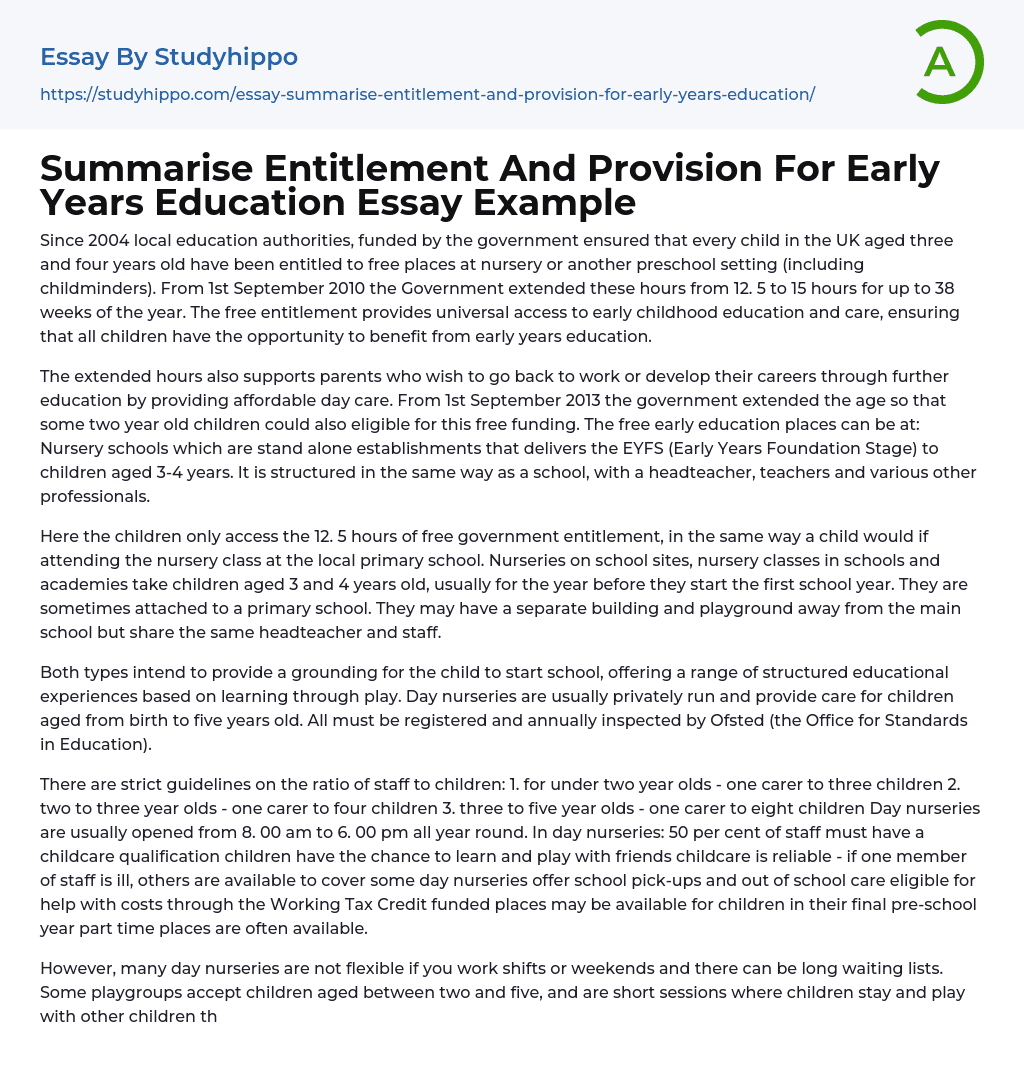

Summarise Entitlement And Provision For Early Years Education Essay Example
Since 2004 local education authorities, funded by the government ensured that every child in the UK aged three and four years old have been entitled to free places at nursery or another preschool setting (including childminders). From 1st September 2010 the Government extended these hours from 12. 5 to 15 hours for up to 38 weeks of the year. The free entitlement provides universal access to early childhood education and care, ensuring that all children have the opportunity to benefit from early years education.
The extended hours also supports parents who wish to go back to work or develop their careers through further education by providing affordable day care. From 1st September 2013 the government extended the age so that some two year old children could also eligible for this free funding. The fre
...e early education places can be at: Nursery schools which are stand alone establishments that delivers the EYFS (Early Years Foundation Stage) to children aged 3-4 years. It is structured in the same way as a school, with a headteacher, teachers and various other professionals.
Here the children only access the 12. 5 hours of free government entitlement, in the same way a child would if attending the nursery class at the local primary school. Nurseries on school sites, nursery classes in schools and academies take children aged 3 and 4 years old, usually for the year before they start the first school year. They are sometimes attached to a primary school. They may have a separate building and playground away from the main school but share the same headteacher and staff.
Both types intend to provid
a grounding for the child to start school, offering a range of structured educational experiences based on learning through play. Day nurseries are usually privately run and provide care for children aged from birth to five years old. All must be registered and annually inspected by Ofsted (the Office for Standards in Education).
There are strict guidelines on the ratio of staff to children: 1. for under two year olds - one carer to three children 2. two to three year olds - one carer to four children 3. three to five year olds - one carer to eight children Day nurseries are usually opened from 8. 00 am to 6. 00 pm all year round. In day nurseries: 50 per cent of staff must have a childcare qualification children have the chance to learn and play with friends childcare is reliable - if one member of staff is ill, others are available to cover some day nurseries offer school pick-ups and out of school care eligible for help with costs through the Working Tax Credit funded places may be available for children in their final pre-school year part time places are often available.
However, many day nurseries are not flexible if you work shifts or weekends and there can be long waiting lists. Some playgroups accept children aged between two and five, and are short sessions where children stay and play with other children their age. Registered Childminders are childcare professionals working in their own homes to provide care and education for other people's children in a family setting. They have to be inspected and registered by Ofsted in England. Many Registered Childminders
are flexible and will work to the hours that parents need. This makes Childminding a valuable childcare option for parents.
All Registered Childminders in England are legally required to complete a pre-registration briefing session and must have completed a local authority approved training course to help them understand and implement the EYFS before they can register with Ofsted. They must also complete a 12 hour Paediatric First Aid Course and gain a certificate as part of their registration. Sure Start Children’s Centres are places that provide information and services for families with young children aged from birth to five years in the local community. Sure Start is the government's programme to support young children and families.
The establishment of multi-agency Sure Start Children's Centres brings together early learning, health and family support. They actively support parents in their aspirations towards employment, education and training. The Sure Start approach ensures that every child gets the best possible start in life and helps parents choose with confidence how they balance their work and family commitments. Nannies and home-based carers: Provide care for children in your home and can look after children of any age. Early years education funding will only be available in an Ofsted inspected setting which is found to be of a satisfactory level.
- Childhood Memory essays
- Academia essays
- Higher Education essays
- Language Learning essays
- Studying Business essays
- Education System essays
- Study essays
- First Day of School essays
- Scholarship essays
- Pedagogy essays
- Curriculum essays
- Coursework essays
- Studying Abroad essays
- Philosophy of Education essays
- Purpose of Education essays
- Brainstorming essays
- Educational Goals essays
- Importance Of College Education essays
- Brown V Board of Education essays
- The Importance Of Higher Education essays
- Online Education Vs Traditional Education essays
- Academic And Career Goals essays
- Academic Integrity essays
- Brown Vs Board Of Education essays
- Distance learning essays
- Technology in Education essays
- Vocabulary essays
- Writing Experience essays
- Importance of Education essays
- Early Childhood Education essays
- Academic Degree essays
- Academic Dishonesty essays
- School Uniform essays
- Academic writing essays
- Cheating essays
- Bachelor's Degree essays
- MBA essays
- College Life essays
- Grade essays
- Diploma essays
- Phonology essays
- Sentence essays
- Filipino Language essays
- Pragmatics essays
- Millennium Development Goals essays
- History Of Education essays
- Graduate School essays
- Middle School essays
- School essays
- Special Education essays



